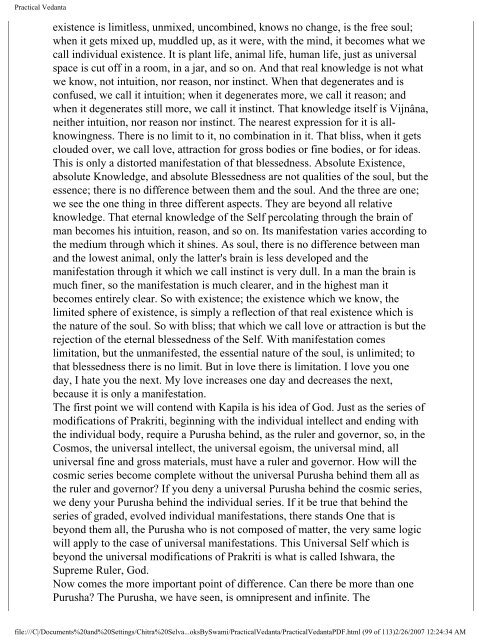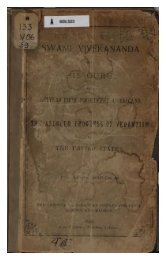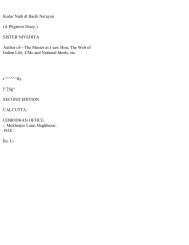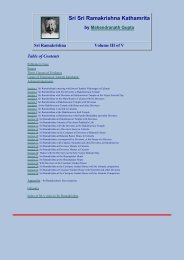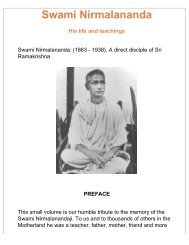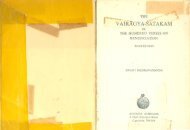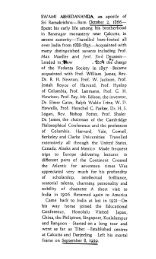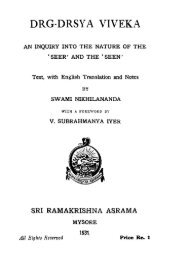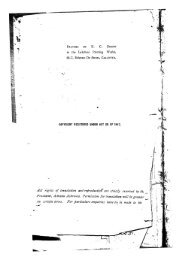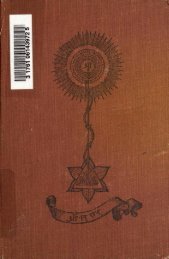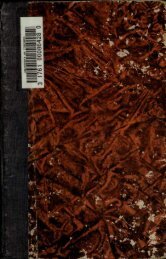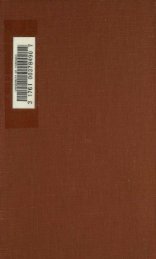<strong>Practical</strong> <strong>Vedanta</strong>it has gained it, the soul finds it was never in nature, that it was entirely separate,that it is indestructible, that it cannot go and come; that going to heaven and beingborn again were in nature, and not in the soul. Thus the soul becomes free. Allnature is working for the enjoyment and experience of the soul. It is getting thisexperience in order to reach the goal, and that goal is freedom. But the souls aremany according to the Sankhya philosophy. There is an infinite number of souls.The other conclusion of Kapila is that there is no God as the Creator of theuniverse. Nature is quite sufficient by itself to account for everything. God is notnecessary, says the Sankhya.The <strong>Vedanta</strong> says that the Soul is in its nature Existence absolute, Knowledgeabsolute, Bliss absolute. But these are not qualities of the Soul: they are one, notthree, the essence of the Soul; and it agrees with the Sankhya in thinking thatintelligence belongs to nature, inasmuch as it comes through nature. The <strong>Vedanta</strong>also shows that what is called intelligence is a compound. For instance, let usexamine our perceptions. I see a black-board. How does the knowledge come?What the German philosophers call "the thing-in-itself" of the blackboard isunknown, I can never know it. Let us call it x. The black-board x acts on my mind,and the mind reacts. The mind is like a lake. Throw a stone in a lake and areactionary wave comes towards the stone; this wave is not like the stone at all, itis a wave. The black-board x is like a stone which strikes the mind and the mindthrows up a wave towards it, and this wave is what we call the black-board. I seeyou. You as reality are unknown and unknowable. You are x and you act upon mymind, and the mind throws a wave in the direction from which the impact comes,and that wave is what I call Mr. or Mrs. So-and-so. There are two elements in theperception, one coming from outside and the other from inside, and thecombination of these two, x + mind, is our external universe. All knowledge is byreaction. In the case of a whale it has been determined by calculation how longafter its tail is struck, its mind reacts and the whale feels the pain. Similar is thecase with internal perception. The real self within me is also unknown andunknowable. Let us call it y. When I know myself as so-and-so, it is y + the mind.That y strikes a blow on the mind. So our whole world is x + mind (external), andy + mind (internal), x and y standing for the thing-in-itself behind the external andthe internal worlds respectively.According to <strong>Vedanta</strong>, the three fundamental factors of consciousness are, I exist,I know, and I am blessed The idea that I have no want, that I am restful, peaceful,that nothing can disturb me, which comes from time to time, is the central fact ofour being, the basic principle of our life; and when it becomes limited, andbecomes a compound, it manifests itself as existence phenomenal, knowledgephenomenal, and love. Every man exists, and every man must know, and everyman is mad for love. He cannot help loving. Through all existence, from thelowest to the highest, all must love. The y, the internal thing-in-itself, which,combining with mind, manufactures existence, knowledge, and love, is called bythe Vedantists. Existence absolute, Knowledge absolute, Bliss absolute. That realfile:///C|/Documents%20and%20Settings/Chitra%20Selva...oksBySwami/<strong>Practical</strong><strong>Vedanta</strong>/<strong>Practical</strong><strong>Vedanta</strong>PDF.html (98 of 113)2/26/2007 12:24:34 AM
<strong>Practical</strong> <strong>Vedanta</strong>existence is limitless, unmixed, uncombined, knows no change, is the free soul;when it gets mixed up, muddled up, as it were, with the mind, it becomes what wecall individual existence. It is plant life, animal life, human life, just as universalspace is cut off in a room, in a jar, and so on. And that real knowledge is not whatwe know, not intuition, nor reason, nor instinct. When that degenerates and isconfused, we call it intuition; when it degenerates more, we call it reason; andwhen it degenerates still more, we call it instinct. That knowledge itself is Vijnâna,neither intuition, nor reason nor instinct. The nearest expression for it is allknowingness.There is no limit to it, no combination in it. That bliss, when it getsclouded over, we call love, attraction for gross bodies or fine bodies, or for ideas.This is only a distorted manifestation of that blessedness. Absolute Existence,absolute Knowledge, and absolute Blessedness are not qualities of the soul, but theessence; there is no difference between them and the soul. And the three are one;we see the one thing in three different aspects. They are beyond all relativeknowledge. That eternal knowledge of the Self percolating through the brain ofman becomes his intuition, reason, and so on. Its manifestation varies according tothe medium through which it shines. As soul, there is no difference between manand the lowest animal, only the latter's brain is less developed and themanifestation through it which we call instinct is very dull. In a man the brain ismuch finer, so the manifestation is much clearer, and in the highest man itbecomes entirely clear. So with existence; the existence which we know, thelimited sphere of existence, is simply a reflection of that real existence which isthe nature of the soul. So with bliss; that which we call love or attraction is but therejection of the eternal blessedness of the Self. With manifestation comeslimitation, but the unmanifested, the essential nature of the soul, is unlimited; tothat blessedness there is no limit. But in love there is limitation. I love you oneday, I hate you the next. My love increases one day and decreases the next,because it is only a manifestation.The first point we will contend with Kapila is his idea of God. Just as the series ofmodifications of Prakriti, beginning with the individual intellect and ending withthe individual body, require a Purusha behind, as the ruler and governor, so, in theCosmos, the universal intellect, the universal egoism, the universal mind, alluniversal fine and gross materials, must have a ruler and governor. How will thecosmic series become complete without the universal Purusha behind them all asthe ruler and governor? If you deny a universal Purusha behind the cosmic series,we deny your Purusha behind the individual series. If it be true that behind theseries of graded, evolved individual manifestations, there stands One that isbeyond them all, the Purusha who is not composed of matter, the very same logicwill apply to the case of universal manifestations. This Universal Self which isbeyond the universal modifications of Prakriti is what is called Ishwara, theSupreme Ruler, God.Now comes the more important point of difference. Can there be more than onePurusha? The Purusha, we have seen, is omnipresent and infinite. Thefile:///C|/Documents%20and%20Settings/Chitra%20Selva...oksBySwami/<strong>Practical</strong><strong>Vedanta</strong>/<strong>Practical</strong><strong>Vedanta</strong>PDF.html (99 of 113)2/26/2007 12:24:34 AM
- Page 1 and 2:
Practical VedantaPractical VedantaP
- Page 3 and 4:
Practical Vedantaworld. If I am a s
- Page 5 and 6:
Practical Vedantadifference is only
- Page 7 and 8:
Practical VedantaThe ideal of faith
- Page 9 and 10:
Practical Vedantamoment of our live
- Page 11 and 12:
Practical Vedantaof the Christs and
- Page 13 and 14:
Practical Vedanta"This life is Brah
- Page 15 and 16:
Practical Vedantadark fifteen days,
- Page 17 and 18:
Practical Vedantalife. This is the
- Page 19 and 20:
Practical Vedantaeverything would b
- Page 21 and 22:
Practical Vedantait is only through
- Page 23 and 24:
Practical Vedantawhich is that subt
- Page 25 and 26:
Practical Vedantanoumenon and pheno
- Page 27 and 28:
Practical Vedantato which is the be
- Page 29 and 30:
Practical VedantaAbsolute.The finit
- Page 31 and 32:
Practical Vedantawhich is not the q
- Page 33 and 34:
Practical Vedantaexperience that th
- Page 35 and 36:
Practical Vedantafulfilled. The Jiv
- Page 37 and 38:
Practical Vedantabetween the pure r
- Page 39 and 40:
Practical Vedantacome out straight.
- Page 41 and 42:
Practical Vedantawar with one anoth
- Page 43 and 44:
Practical Vedantanobody could under
- Page 45 and 46:
Practical VedantaMy idea, therefore
- Page 47 and 48: Practical Vedantathe same methods.
- Page 49 and 50: Practical Vedantavarious minds, all
- Page 51 and 52: Practical Vedantabrotherhood; but t
- Page 53 and 54: Practical Vedantabrotherhood, but w
- Page 55 and 56: Practical Vedantawe all go with ves
- Page 57 and 58: Practical Vedantareason. What can y
- Page 59 and 60: Practical Vedantabeen preached in t
- Page 61 and 62: Practical Vedantathe husband kisses
- Page 63 and 64: Practical Vedantaof the knowledge a
- Page 65 and 66: Practical Vedantafor those who only
- Page 67 and 68: Practical Vedantasun exists because
- Page 69 and 70: Practical Vedantaof death was pleas
- Page 71 and 72: Practical VedantaGod. We must learn
- Page 73 and 74: Practical Vedantaa plague comes, it
- Page 75 and 76: Practical VedantaAtman? "As with a
- Page 77 and 78: Practical Vedantathat immortal One,
- Page 79 and 80: Practical Vedantaand the third egoi
- Page 81 and 82: Practical VedantaWitness of the uni
- Page 83 and 84: Practical VedantaPractical Vedanta1
- Page 85 and 86: Practical Vedantaeternal ; every ot
- Page 87 and 88: Practical Vedantafaculty, Buddhi, w
- Page 89 and 90: Practical VedantaPractical Vedanta1
- Page 91 and 92: Practical Vedantastepping-stone to
- Page 93 and 94: Practical Vedantarecognition? Findi
- Page 95 and 96: Practical Vedantasentient." This is
- Page 97: Practical Vedantaessentially differ
- Page 101 and 102: Practical Vedantalive, for I am lif
- Page 103 and 104: Practical Vedantasee from Kapila's
- Page 105 and 106: Practical Vedantalimitation, but th
- Page 107 and 108: Practical Vedantaperfect, infinite,
- Page 109 and 110: Practical Vedantaindividuality, of
- Page 111 and 112: Practical Vedantarepeat [something]
- Page 113: Practical Vedantaperson who dies in


